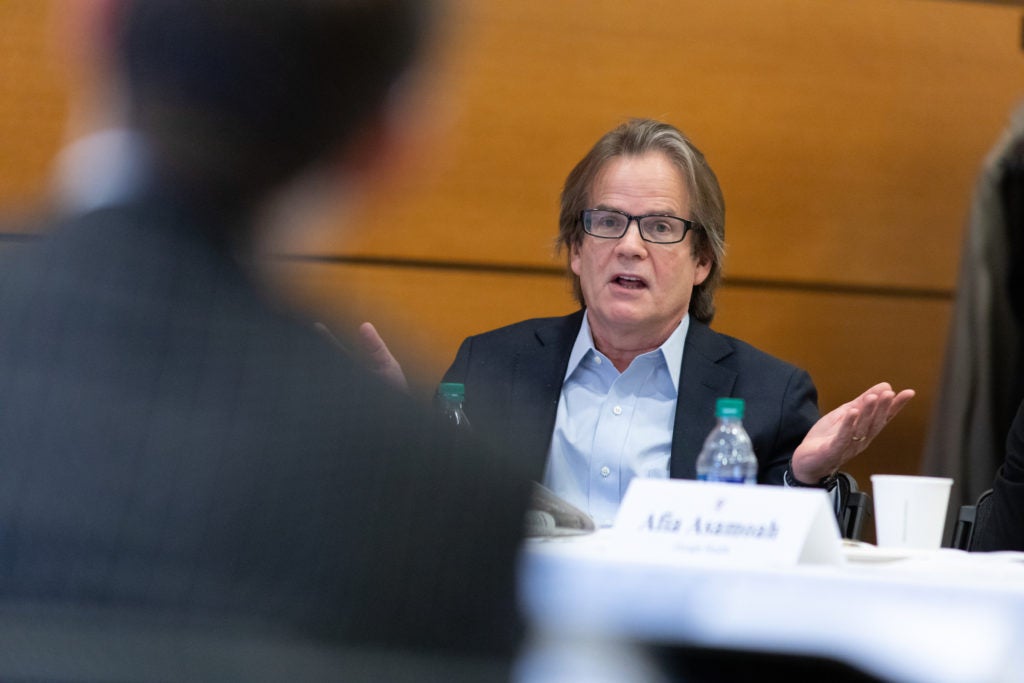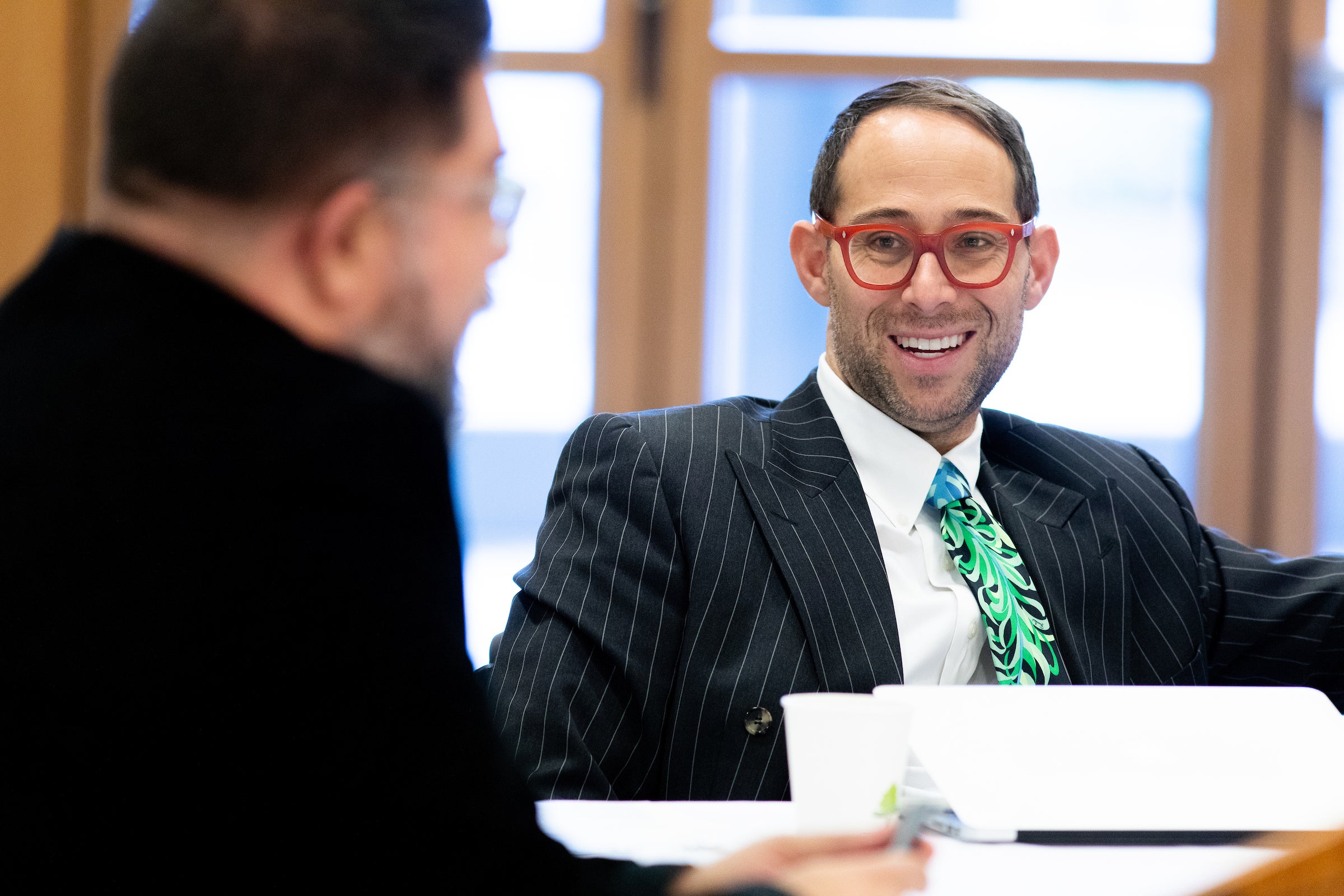General Counsels from some of America’s most important health care institutions – hospitals, insurers, biotechnology companies – came to Harvard Law School in November as part of the General Counsels Roundtable to explore pressing health policy and legal issues facing their companies today. Held biannually, these roundtable meetings, conceived of and hosted by the Petrie-Flom Center for Health Law Policy, Biotechnology, and Bioethics at Harvard Law School, connect leading health law practitioners with marquee experts in health law and related fields and support peer discussion. The result is a multilayered dialogue, where the experts teach and learn from the counsels and the counsels share questions and concerns in a confidential space to learn from one another’s experiences.
The roundtable is unique from other learning opportunities available to the counsels because it utilizes the deep wealth of knowledge available at Harvard Law School.
“General counsels in the health care industry often do not have ready access to other general counsels in the industry, especially if they are in a different sector of the industry, and the Petrie-Flom Center Roundtable is an invaluable opportunity to share ideas and best practices with our peers,”
Jorge Lopez ’84, executive vice president and general counsel at Memorial Sloan Kettering Cancer Center
“General counsels in the health care industry often do not have ready access to other general counsels in the industry, especially if they are in a different sector of the industry, and the Petrie-Flom Center Roundtable is an invaluable opportunity to share ideas and best practices with our peers,” said roundtable participant Jorge Lopez ’84, executive vice president and general counsel at Memorial Sloan Kettering Cancer Center. Afia Asamoah ’05, head of legal at Google Health, also appreciated the opportunity to connect with others in the industry: “At a time when there are many opportunities to innovate to make health care better for everyone, advising health care companies is inspiring, and complex. The General Counsel’s Roundtable offers the unique opportunity to pause, and learn with, and from, other GCs experiencing similar opportunities and challenges,” she said.
The group convened this fall to discuss opportunities and challenges in health law and policy including drug pricing, antitrust issues in health care, algorithmic medicine, and the impact of aging on the health care system.
Benjamin Roin ’05, formerly an assistant professor at the law school and now at Charles River Associates, tackled the topic of pharmaceutical pricing, particularly for drugs delivered in hospitals. He discussed what goes into pricing innovative therapeutics, from conducting focus groups with patients, to surveying physicians and pharmacists. Robert Leibenluft of Hogan Lovells and George Washington Law School drew upon his years of antitrust practice to share insights into emerging antitrust issues in the health care sector, in particular the growing trend toward health systems consolidation, hospital, and physician group mergers. These topics were directly relevant to the counsels from hospitals and insurers, but also were of interest to the members representing pharmaceutical companies.
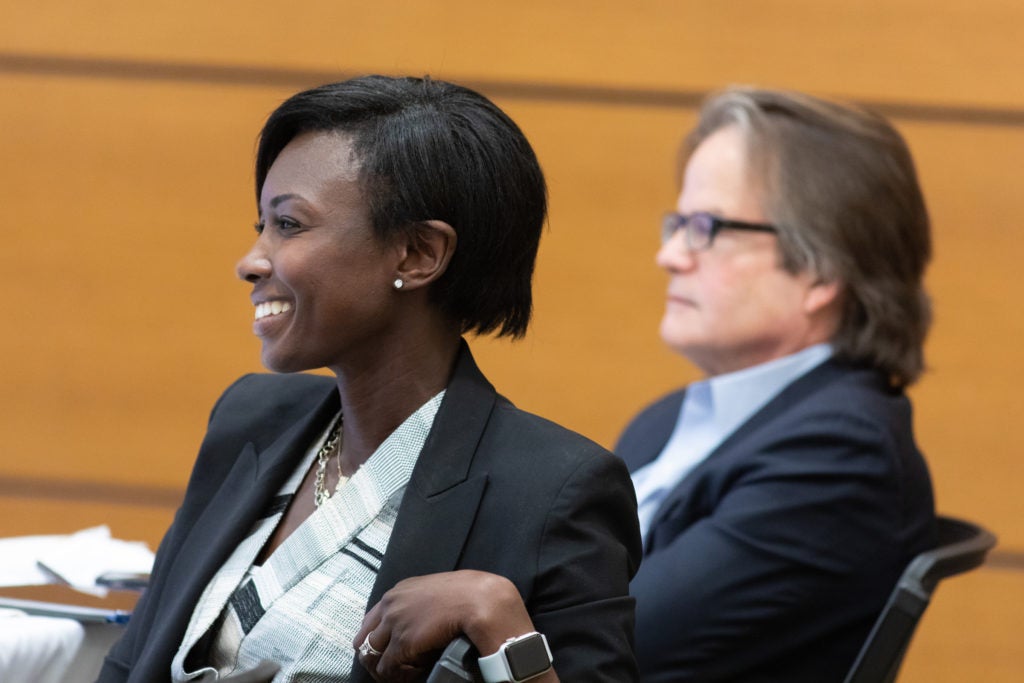
Left: Afia Asamoah ’05, head of legal at Google Health, said she appreciated the opportunity to connect with others in the industry: “At a time when there are many opportunities to innovate to make health care better for everyone, advising health care companies is inspiring, and complex,” she said. “The General Counsel’s Roundtable offers the unique opportunity to pause, and learn with, and from, other GCs experiencing similar opportunities and challenges.”
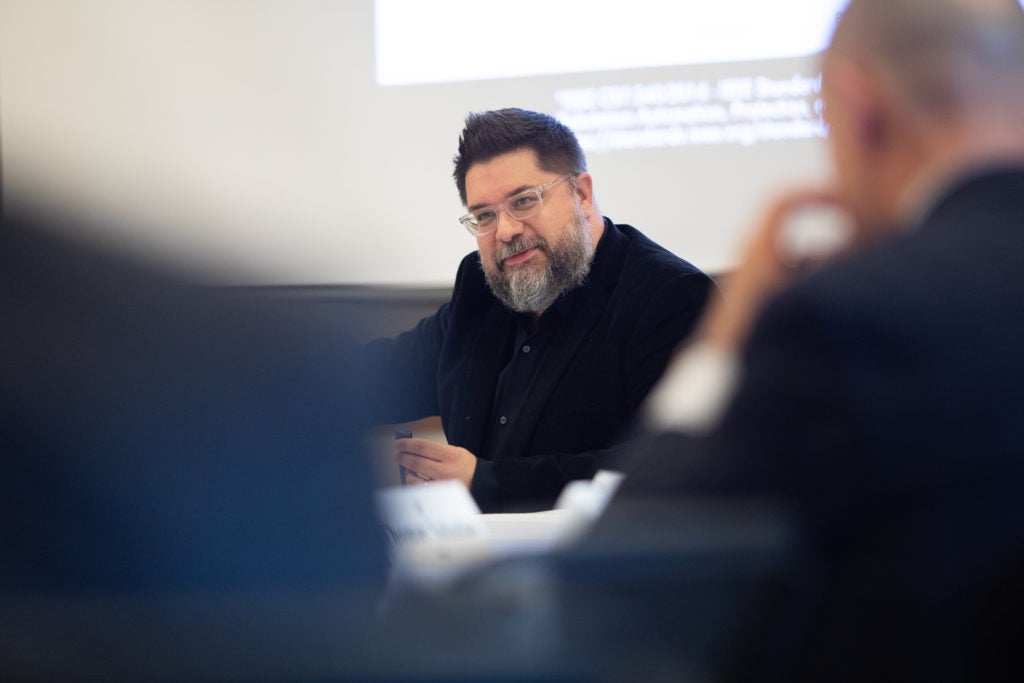
Christopher Bavitz, WilmerHale Clinical Professor of Law and Managing Director of Harvard Law School’s Cyberlaw Clinic, led the group in a discussion of the opportunities and challenges that artificial intelligence, machine learning, and algorithms present to the health care industry.
The roundtable then turned to the impact that data has on the delivery of health care. Harvard Law School’s WilmerHale Clinical Professor of Law Christopher Bavitz, managing director of the school’s Cyberlaw Clinic, led the group in a discussion of the opportunities and challenges that artificial intelligence, machine learning, and algorithms present to the health care industry. The spirited conversation that followed raised questions on how to conceptualize the role of AI in health care decisions. Should AI be used as tool, or decision-maker? Or should it be viewed as a product or service, or even in some sense a “hire” for the system?
I. Glenn Cohen ’03, who serves as director of the Petrie-Flom Center for Health Law Policy, Biotechnology, and Bioethics, built upon the previous discussion and challenged the group to examine their thinking on the necessity of “explainability” as to medical AI. He asked, “Is it totally necessary for a doctor or technician to be able to fully explain how an algorithm produces a result?” He drilled down on how explainable versus non-explainable systems might be treated for purposes of liability or informed consent.
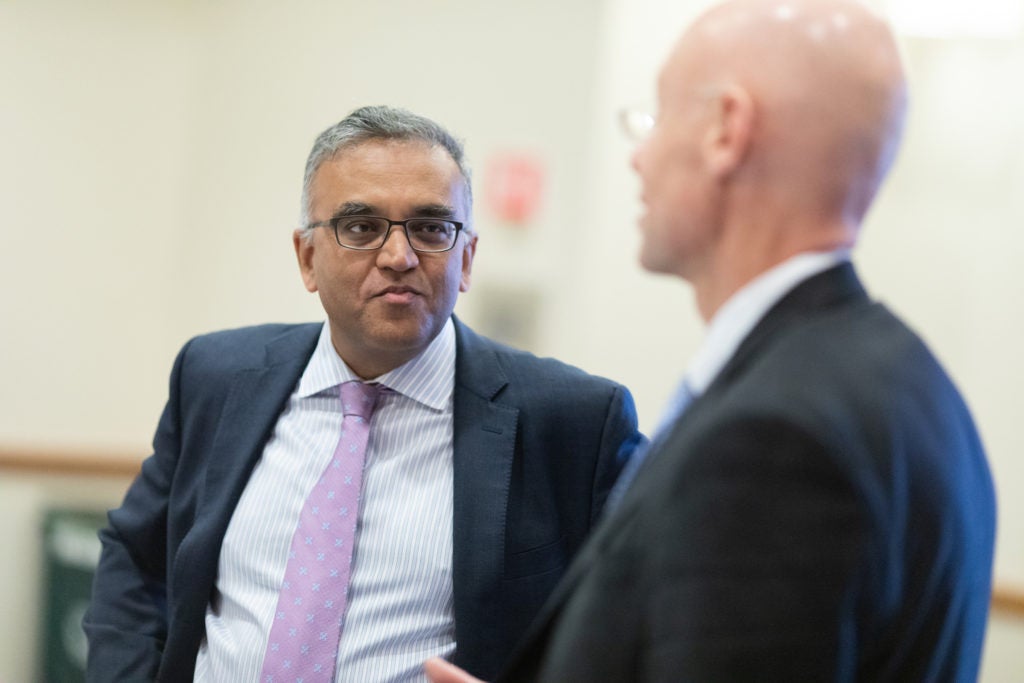
As part of the General Counsels Roundtable, Dr. Ashish Jha, K.T. Li Professor of Global Health at Harvard University, Dean for Global Strategy at the Harvard T.H. Chan School of Public Health, and the Director of the Harvard Global Health Institute, explored the impact of aging on health care systems here in the U.S. and abroad.
One group member, whose company is a major player in health care technology, emphasized the importance of setting principles for the use of AI. Her concerns are helping to shape other Petrie-Flom Center events, to be held at Harvard Law School in the coming semesters, designed to further the conversation around needed regulation of medical AI. Petrie-Flom Center Executive Director Carmel Shachar ’10 notes that this cross-pollination happens frequently at the roundtable meetings. “The roundtable brings leading practitioners to campus, which encourages them to meet with and mentor Harvard Law School students, to speak at events open to the broader Harvard community, and to help shape the research being undertaken at our Centers and clinics,” she said.
Finally, Dr. Ashish Jha, K.T. Li Professor of Global Health at Harvard University, dean for Global Strategy at the Harvard T.H. Chan School of Public Health, and the director of the Harvard Global Health Institute, explored the impact of aging on health care systems here in the U.S. and abroad. Several members of the group expressed a desire to learn more about how best to support patients “aging in place,” at home with their families as their health needs increase, rather than in a hospital. Jha echoed their concerns, noting the negative impact hospital stays can have on aging patients’ physical and cognitive health.
Significant growth in the aging population led many members of the group to ask how to best position their companies to respond to the upcoming “silver tsunami.” Questions they asked included: How can providers prepare as Baby Boomers’ health needs become greater and more complex? How can digital health and biotechnology companies develop products that will address the needs of an aging population? and How can insurers best manage care for enrollees who will require more help with daily activities?
In the past, the roundtable hosted talks from Harvard Law School Professors I. Glenn Cohen on the use of data in novel health technologies; David Wilkins ’80 , director of the Center on the Legal Profession at Harvard Law School, on the unique challenges facing General Counsels; and Scott Westfahl ’88, director of Harvard Law School Executive Education, on crisis management. The roundtable has also drawn from the expertise of the broader Harvard University community, including hosting Harvard Business School Professor Michael Porter on value based health care and Harvard Stem Cell Institute Executive Director Brock Reeve on the future of stem cell technology. Other speakers include leadership from the Centers for Medicare and Medicaid Services and partners from leading law firms. Faculty report that the roundtable is an interesting opportunity for them to get feedback on their work from lawyers helping lead companies on the vanguard of health care delivery, financing, and biotechnology.
“The roundtable is a fantastic opportunity for health law academic and business leaders to come together,” notes Cohen. “Not only do the counsels get the opportunity to engage in small group discussions with Harvard Law School faculty, but professors conducting research in the health law and policy field get to receive direct feedback on their work from people best positioned to have unique insights into developments in this area.”
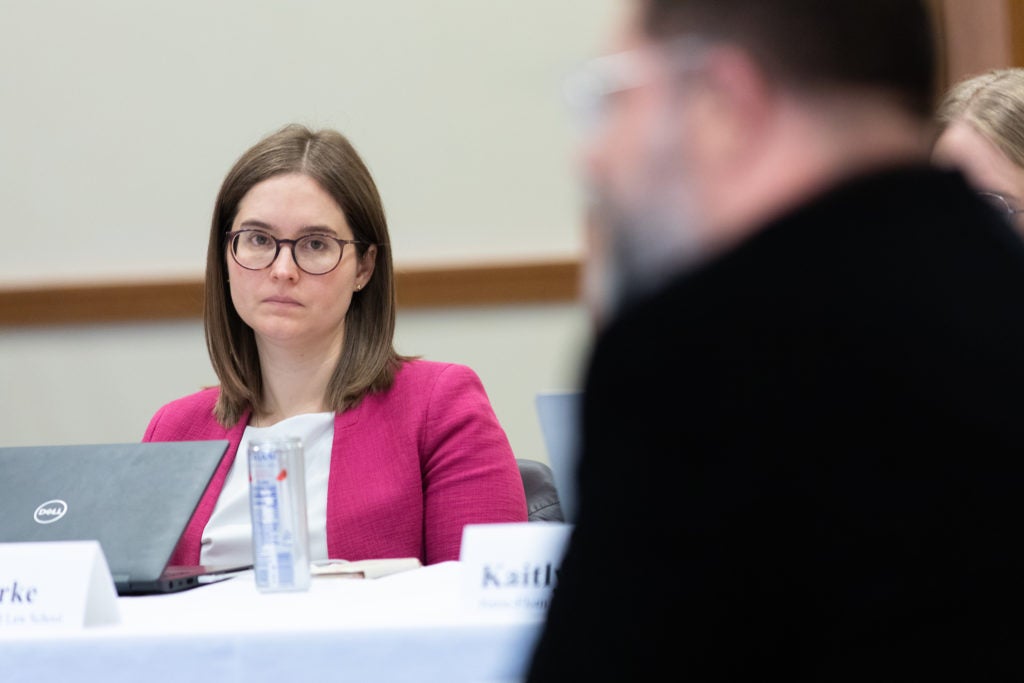
Sara Gerke, research fellow in Artificial Medicine, Intelligence, and Law at the Petrie-Flom Center, looks on during Chris Bavitz’s presentation on algorithmic medicine.
Health law and policy is a constantly evolving field thanks in part to political developments and technological breakthroughs. The General Counsels Roundtable helps influential health law attorneys stay on top of or even ahead of these changes through connecting them to experts at the Law School and broader University. The roundtable also helps shape the work being done at the Law School by strengthening ties between faculty.
